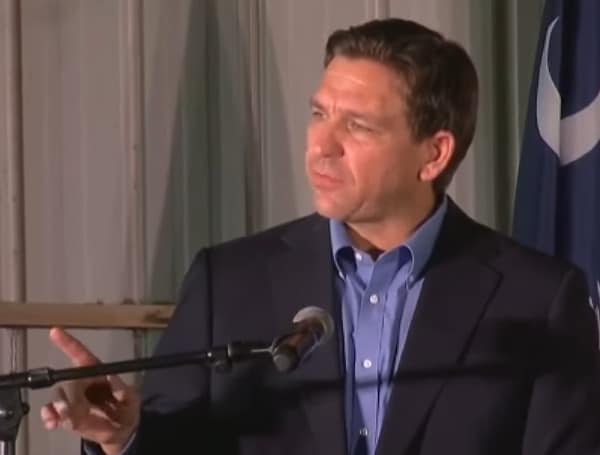In a case that has drawn attention from media organizations and open-government advocates, state lawyers late Monday urged an appeals court to uphold a ruling that said “executive privilege” shields Gov. Ron DeSantis’ administration from releasing records.
Lawyers in DeSantis’ office and Attorney General Ashley Moody’s office filed a brief disputing arguments that the use of executive privilege conflicts with a 1992 constitutional amendment aimed at providing access to public records.
The case stems from a person, identified in court documents as J. Doe, filing a public-records request seeking information from DeSantis’ office about people involved in discussions about appointing Florida Supreme Court justices. In a subsequent lawsuit, Leon County Circuit Judge Angela Dempsey rejected the public-records request on a series of grounds, including executive privilege.
Read: Florida Gov. DeSantis Praises House Republicans Showing “Sound Judgment” On Israel Aid
“The confidentiality of consultations with advisors — precisely the information Doe demands here — is critical to the execution of the governor’s constitutional duty to fill judicial vacancies, and Doe has not identified any need for this information that would overcome the governor’s presumptive privilege to maintain that confidentiality,” the state’s 52-page brief Monday said.
The brief, filed at the 1st District Court of Appeal, also said executive privilege was not “overridden” by the 1992 public-records amendment.
“Maintaining the confidentiality of deliberations concerning judicial appointments is necessary to enable the governor and his aides to receive candid, unfiltered advice regarding the exercise of an important constitutional function,” the brief said.
But in two friend-of-the court briefs filed in July, state and national media organizations and open-government advocacy groups said such use of executive privilege would undermine Florida’s public-records law.
One brief filed by a coalition that includes groups such as the League of Women Voters and the Florida Center for Government Accountability, said the circuit-court ruling “upends decades of jurisprudence interpreting” the public-records law.
“In the 178 years that Florida has existed, not a single (other) court decision has recognized the existence of any executive privilege,” attorneys for the groups wrote.
Read: Unlike Disney In Florida, Netflix Shows That Rejecting Wokeness Can Pay Off
The case is rooted in an Aug. 25, 2022, interview in which DeSantis told conservative commentator Hugh Hewitt that a group of “six or seven pretty big legal conservative heavyweights” had helped him screen candidates for appointment to the Florida Supreme Court.
J. Doe filed a public-records request seeking information from DeSantis’ office about people involved in the Supreme Court appointment process. J. Doe filed a lawsuit after not receiving records.
The issue went to the 1st District Court of Appeal in January after Dempsey ruled against the requester. While the ruling also involved other grounds, Dempsey wrote that the “purpose underlying the executive privilege supports its recognition here.”
“To effectively discharge his constitutional duty, the governor must be permitted to have access to candid advice in order to explore policy alternatives and reach appropriate decisions,” she wrote, citing rulings from the U.S. Supreme Court and other states. “The interest in maintaining the confidentiality of the executive is vital to the public, as it fosters informed and sound gubernatorial deliberations and decision making.”
But attorneys for J. Doe wrote in a June 29 brief at the appeals court that Dempsey “invented something previously unknown to Florida law: an ‘executive privilege’ against the constitutionally mandated disclosure of public records. In doing so, the trial court disregarded the unambiguous text of the Florida Constitution, which creates a right of access to public records in the absence of specified circumstances that are not present here.”
The media organizations and other groups that signed on to briefs in July were the Associated Press; Cable News Network, Inc.; CMG Media Corp., doing business as Cox Media Group; Gannett Co., Inc.; Graham Media Group, Inc.; The McClatchy Company LLC, doing business as the Miami Herald; The New York Times Co.; Nexstar Media Group, Inc.; Orlando Sentinel Media Group; The E.W. Scripps Co.; Sun Sentinel Media Group; Times Publishing Co.; NBC Universal Media, LLC; the First Amendment Foundation; the Florida Center for Government Accountability; Integrity Florida Institute, Inc.; the League of Women Voters of Florida and the League of Women Voters of Florida Education Fund; and American Oversight.
The News Service of Florida is not one of the media organizations involved in the case.
Android Users, Click To Download The Free Press App And Never Miss A Story. Follow Us On Facebook and Twitter. Signup for our free newsletter.
We can’t do this without your help; visit our GiveSendGo page and donate any dollar amount; every penny helps

